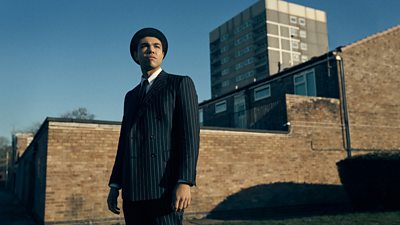
Set in a world of family ties, teenage kicks and the exhilarating music of a generation, This Town tells the story of a band’s formation against a backdrop of violence, capturing how creative genius can emerge from a time of madness. Both a high octane thriller and a family saga, This Town opens in 1981 at a moment of huge social tensions and unrest. Against this backdrop, it tells the story of a group of young people fighting to choose their own paths in life, and each in need of the second chance that music offers.
This Town (6x60) is produced by Kudos (a Banijay UK company) and Nebulastar for the BBC, co-produced with Mercury Studios, in association with Kudos North, Stigma Films and Nick Angel.
This Town is available in full on BBC iPlayer from 6am on Sunday 31 March, with episodes one and two airing on BBC One at 9pm on Sunday 31 March and Monday 1 April. The series continues on BBC One on Sundays at 9pm.
SH2
Interview with creator, writer and executive producer, Steven Knight
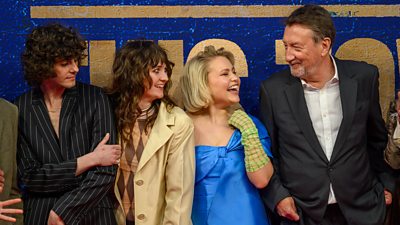
How would you set the scene for This Town?
The setting and backdrop for This Town is 1981, Birmingham and Coventry. ‘81 was a time of turmoil and change in every sense - in society, in politics but in music as well. This series opens with a riot and I hope the sense of ‘riot’ continues throughout the whole thing. The riot was a real thing, it happened in Handsworth, Birmingham and I’ve used that to introduce four very different characters who will come together.
You might say it’s about music or it’s about people who are drawn to a certain type of music, but I’ve tried not to do that. I didn’t really want to do a thing about people who form a band, which is part of what it is, I wanted to create a group people who have no choice other than to form a band because all the other options are so bleak. Having said that I hope ‘bleak’ isn’t a word that people use to describe this, because what I’m trying to do is meet these people living their lives on big, sprawling housing estates in the early 80s and it’s beautiful. The place is beautiful. The series is not trying to say ‘isn’t it awful’.
Why did you want to write this story?
I wanted to do something partly from my own experience, as I grew up in an environment not entirely dissimilar. The music was around at the time and for us it was ‘other’, it was different and everyone liked it. I’m not trying to set out to make a political or social point at all, but at this time a particular thing happened where a particular type of music attracted equally black and white people. They danced to and made that music together, not in order to prove a point and not as a consequence of any sort of pressure but because that’s just what happened. I thought that was quite an important thing to illustrate.
It’s depicting working class life without any sense of sorrow or pity and, rather than that, seeing the glory and the glamour of it. I’ve always thought motorways at night are very beautiful so the M6 is a big character in this, and - not necessarily to live in but to look at - huge, big tower blocks, looking down from the top to the rest of the world. I wanted to get all of that in. Luckily our brilliant director Paul Whittington has made it look like a painting.
What is it that draws the characters together to form the band?
They’re drawn together - some of them because they live on the same estate, two of them (Dante and Bardon) because they’re cousins. They’re having their totally different lives, but they’re hard lives that they have to get out of.
We’ve got the poet Dante, played by Levi Brown, who is troubled by the gift he has and the words that come to him. He needs to get them out and it’s not an environment where people write poetry, typically. Bardon is a dancer and singer of Irish ballads, and music and dance competitions are really important in his Irish community. The music in that community, especially at that time, was about their struggle and the political situation. So you have these two people who feel words and music.
None of the characters are brilliant musicians but they have to learn and, bit by bit, they realise the way of getting this all out is via music. I’ve tried to construct it so the jeopardy they’re in is such that, as the script says, the only way they’re going to survive is to get famous, so that’s what they try to do.
How did it feel when the cast came together and started to embody the characters you had on the page?
It was a very specific moment actually - it was at the readthrough of the first episode, when everyone got together to read the script out loud, but they didn’t yet know each other. Readthroughs can be quite awkward and nervous, but this one just sang. They weren’t all sat near together but they were connected in a way.
You could really feel the humour which is the most difficult thing in a readthrough, because it’s hard to get ‘funny’ in a place like that. But the humour was coming through, they all got it, and when the line was ironic they knew it was ironic. That’s when I thought “wow, this is really something”.
What part does music play for different characters?
For each character there is a role for music. For Bardon music for him is this Irish rebel music, it represents what his dad does, the danger, the jeopardy and the thing he doesn’t want. For Dante it’s words and he can’t cope with how they come to him, he needs to get them away.
For Deuce, Dante’s dad who is a preacher, there is gospel music which for him is the lifeline to save him from addiction. Estella, Bardon’s mum, could’ve made it in the 60s and 70s, because she is a brilliant singer – and luckily Michelle Dockery is also a brilliant singer. For Estella music is what might’ve been. It’s a different thing for all of them but it fits when they all come together.
Michelle Dockery (Estella)
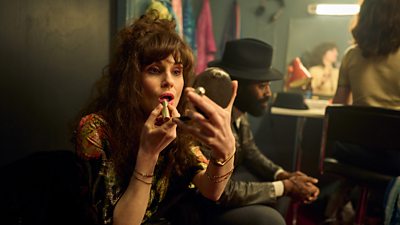
Who do you play, and how does she fit into This Town?
I play Estella, the mother of Bardon who is one of the group who set up the band. Estella has been exiled in some way from the community. Estella is the wife of Eamonn, who has been recruited by the IRA and has been working for them for many years. Estella, we assume, has begun to have a drinking problem from the time that Eamonn started working for the IRA and due to her being loose-lipped and talking far too much about what she knows she has to be removed from the community.
So we find Estella living outside of the estate in very bad conditions. For her, it feels like she is very much on the outskirts of her community, that she used to be part of. The relationship is very fractured between Eamonn and Bardon, and Estella misses her son very much because she doesn't spend much time with him, but across the series the music actually brings them together.
It’s really beautiful because Estella is a singer and she used to sing in clubs around the town, but due to her problems with addiction she is no longer doing that. The band reignites that artistic and creative side of Estella which also helps with her addiction, and she tries to tackle that.
What drew you to This Town?
I fell in love with the script upon the first few pages. I think Steven Knight is the most brilliant and prolific writer and it was an instant yes from me to this job. I just instantly wanted to play Estella. There’s a scene in a church at a funeral involving a song that was a pinpoint for me. I'm a singer, so to be able to sing in a show and play character who's a singer was something that really drew me to the series.
It's been really fun, the music side of it. We've absolutely loved it and the music being created from scratch from our brilliant collaborators has been a real joy.
How was it working with Kae Tempest and Dan Carey?
It was fantastic. Working with Dan Carey and meeting Kae Tempest, that was just a dream for me because I'm such a fan. And the lyrics are just beautiful. The whole character of Dante as a poet - what they've done is give him the most beautiful lyrics. So that part of the process has been wonderful.
I love working in the studio and recording and so it’s been really nice to tap into that part. Paul Whittington is an absolutely incredible director, and he really sets the tone from the beginning. He's so passionate about this story and about the music.
Levi Brown (Dante)
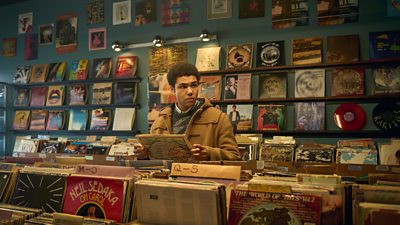
Can you set the scene of the show?
We are in Birmingham and Coventry in 1981 and it’s kicking off. There is a huge sense of injustice and unfairness going on at the time. I think people aren’t happy, people are angry. We meet all of our characters in the middle of that.
How would you describe the premise of the show?
There is a real sense of not wanting to be on a certain path, of fighting a destiny that feels like other people are setting for you. When injustice and unfairness is rampant the only thing you can do is come together and make some noise. I think back then that was more a thing to do than it is now. Back then we didn’t have social media so you couldn’t just go on Twitter and rant about what’s going on, you actually had to go out there and do something about it. For a lot of the characters it’s about wanting more, wanting more than what’s being offered, expressing themselves and making it work in their favour.
What can you tell us about your character, Dante?
He brings a lot, and he is quite relentless. I suppose one of the things people should know about him is that he is in love when we first meet him. I think that’s so lovely, the simplicity of that. Then it develops into something completely different. He is a poet and I think that’s one of the first things I honed in on. It’s a way of expressing yourself. It’s not usually for other people, its usually for yourself. He obviously felt this need to express himself and do something and that was it. When we first meet him the big thing he is focusing on is love and Fiona.
What were some of the challenges involved with being this character?
One of the biggest challenges was the guitar. My fingers are not my fingers anymore. They were sort of broken and healed over and now I have got guitar hands.
I am from Dudley and the accent is different to a Birmingham accent, but it came quite naturally. I think the way that Steven writes, the rhythmic nature of it helps you naturally form this rhythm with your voice and the way you say things.
What was it like to come together as a band?
The first time we had come together as a band was when we did the screentest together. It was the day after we all met properly. We were all staying in the same hotel and we met for a drink. It instantly clicked, it was mental because we felt like we had known each other for a long time. A weirdly long time. We have these ‘BFF’ bracelets now that Ben bought us. We spend so much time together now, outside of work. Ben is actually in a band so we went to see him, it was great.
When we eventually got to band rehearsals it was like everything a band goes through in sort of a decade, we went through in about a month. Arguments, disagreements, highs, lows, all of it. It was intense but it was so good. We got to the point where we did covers. When we got bored of our songs we would start doing covers and School of Rock songs. We did some Blink 182. It was brilliant.
Can you tell us a bit about Dante’s look and how that changes?
I feel like there are definitely characters in this show who are a lot cooler than Dante, and have a way better looks. When you first meet him he basically puts on whatever he finds. He is quite neat I suppose, coming back from college with a shirt buttoned to the top.
The duffel coat is iconic and funnily enough some of his early outfits actually look quite cool because they are just so individual, you could probably walk out on the street today wearing that stuff and get along fine.
As the series progresses, he starts to find things that speak to him. I think he starts to wear things that make him feel that he can do it, that he can be that person. As we go on little bits keep dropping in- the hat, then the sunglasses. And then obviously the suit as well. When I first put that on it did feel really uncomfortable, because I don’t really wear suits. But I have now worn that suit so many times when we are performing that it is a part of him and a part of me. It feels great.
What is it about This Town that you think audiences will connect with?
Something I hope that people will take away is just how beautiful Birmingham can be if you can look at it from the right angles.
How does the sound of the band develop through the story?
It starts off too nice, because Dante is still in love and he is still playing with that idea of being in love. He is still writing beautiful poems. The first song he ever writes is a poem which becomes this lovely song about his nan. As he starts to experience more new things, he gets inspired. I think he is someone who constantly looks out for inspiration. I think he sees things that other people don’t and when that starts to become more intense, the music becomes more intense, more felt and real and hard. Hardcore, a bit angry.
How does music influence the decisions of your character in the story?
Music becomes a massive part of Dante’s life and it turns from something that he likes to do into something that he needs to do. He speaks about the music being in his head and coming to him in pictures and colours. I think music motivates him because he just needs to get it out. It needs to leave him. He needs to unleash it onto the world. I think for him music is sort of the thing that moves him all the way through the show, it’s his driving force. If he doesn’t get it out he won’t see the point in doing anything else.
Ben Rose (Bardon)
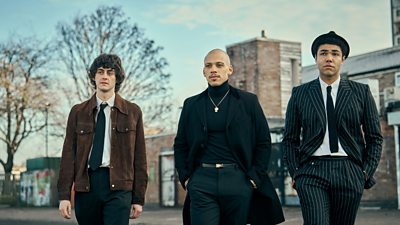
What can you tell us about the family dynamics in This Town?
This Town centres around an extended family in two halves, Dante’s and Bardon’s. When the show starts Dante and Bardon haven’t seen each other for a while.
One of the things I think is really interesting is that Dante’s and Bardon’s dads are very different in terms of how they father. Bardon and Dante are very different in terms of the kind of young men they are or want to be. So the series features really interesting examples of different kinds of men, how they interact and how that influences each other.
What’s also interesting, because their nan and their mums are so important, is how women influence Dante and Bardon. And when the characters get into the band how the women in the band influence Dante and Bardon, teaching them about the other aspects of being a well-rounded man.
And how about the dynamics of the band?
I’ve played guitar and other instruments for a long time and I’ve been in bands since I was a teenager so that stuff is all second nature to me. Freya has been in bands too and she is a class bassist. It’s been good having two of us on each side of the band – Freya being able to lock in with Shyvonne on drums and help her focus on rhythmic stuff and timing, and me being able to lock in with Levi and Eve a bit more. It's also made it really fun because everyone is learning and everyone’s improving at different things, via the supportive elements of being in the band.
Can you describe your character’s ‘look’?
Working with costume designer Molly Emma Rowe has been great, as we had the exact same idea of the core of Bardon and how he’d express himself clothes-wise. At the beginning it’s practical, Bardon only has one pair of boots he wears for the whole series, he’s got two pairs of jeans – a black and a blue pair – then he has his trousers for when he does his Irish dancing. It’s like he doesn’t need any more than that. As the series goes on and he gives himself permission to express himself a bit more, or start to feel more confident and stronger within himself he finds a leather jacket – that classic thing of shedding one skin and trying on another.
How does music impact your character?
On the Irish side it’s huge, music is in the community and day to day life – like singing when you work, having a lock-in with everyone playing and singing. Bardon does Irish dancing as well so he’s always been connected to music in that sense. Also his mum is a singer, she’s always had music in her life and performed when she was younger. In the show there’s not a lot of happy family memories for Bardon, but some of those from his childhood would be singing with his parents.
What do you love about this story?
I love this story because it’s so dramatic and also fun. And all the way through it all the characters really care about each other, they’re always looking out for one another. When everything is going crazy for one of them, someone has their back somewhere.
Eve Austin (Jeannie)
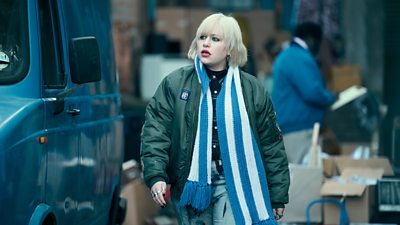
How would you describe the premise of This Town?
The show is centred around a group of young people who find each other in different circumstances, they all come from different lives. But equally they are all facing hardship, they’re all having a difficult time, like being young which can be difficult in itself. Them connecting with one another and bringing their experiences together to help one another is all done through the beautiful artform of music. Sometimes it’s easier to speak with music than it is with words, I think that’s what they find with each other.
What are the core themes of the show? Do they resonate with you?
Hugely. To me, friendship is the underlying theme of the show. It’s what saves each and every one of the lead characters who you meet, even above family in some aspects. That resonates with me, the platonic relationships in my life are the most important thing, they bring you up out of the darkness all the time and I don’t think they get enough credit. Often a lot is swayed towards how important romantic relationships are, when actually in This Town - with all the characters getting something from each other in this big friendship group - for me friendship is the most important theme.
What was it like when the cast first came together?
A lot of us come from very similar backgrounds and experiences. Myself, Levi and Ben are all Midlands kids which is different to being a southerner or a northerner, as it has its own world. It felt like we’d known each other for years, which is amazing and really lucky because it’s a tough thing to pull off – half of us weren’t musicians before we started this. To have the support of people who do know it better and to feel incredibly supported all the time – I don’t really know how we’d do it without that.
What can you tell us about your character?
I play Jeannie, we meet her pretty much immediately in the riot scene. She sees Dante who she knows from school and they go on an adventure together that night. She actually becomes the catalyst for everything moving forward, as she introduces Dante to music, and pushes him out of his comfort zone. Behind everything she’s a driving force, which I think women often are, so I’m very proud of her for that. Jeanie is super protective of Dante and I think a brother/sister role is what comes through the scripts and it comes through when we’re working together. Jeannie is a bit bossy and she likes to be in charge so it works very well, as I think Dante likes to follow.
What were the challenges in taking on this role?
It truly is the most beautiful piece of writing I have ever read, and whenever you’re doing something that reads so well on the page you put so much pressure on yourself to deliver it well,. I wanted to do it justice because I feel so connected to my part.
Learning an instrument - the keyboard - for the first time has been very interesting. I’ve had a lot of help, a brilliant teacher and we’ve got amazing music producers on this who are wonderful because they make such a chilled environment on this.
How did it feel recording the music with Dan Carey, and coming together as a band?
We did a lot of rehearsals at Dan’s studio which were always the most fun, as we’d do it for the whole day. It’s all about communicating with each other, and Ben and Freya who play in bands separately to the show were so brilliant at helping everyone else.
How does music impact the society Jeannie lives in?
It bring people of all subcultures together, merging people who might not even speak together but then they dance and hear the music together. That’s a very bonding experience. It’s escapism for everybody and at a difficult time that’s a really important thing for human beings to have.
Freya Parks (Fiona)
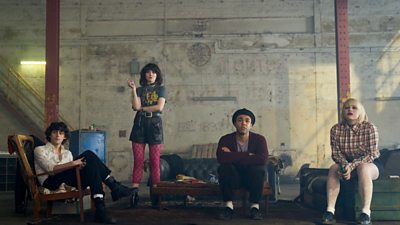
Tell us about, Fiona
Fiona is from Sutton Coldfield, she works at a record shop in Birmingham. Fiona is the love of Dante’s life but maybe she doesn’t totally feel the same way about him. She is massively drawn to him though, and there is very much a kindred spirit going on between them, and then they bond over Leonard Cohen which is a good way to continue a relationship. She has a very good sense of who she is in terms of music and fashion, she loves experimenting and exploring. Her sense of self is quite strong but she hasn’t found her people and so when the band is formed I think there is, for many other reasons as well, a big driving force as to why she wants to make it work. She has been craving that I think.
What was your experience with This Town’s music?
I was really excited to learn that there was this duality. I’m in a couple of bands outside of acting, so it was really exciting to work on a project that combines the two. It was pretty early on that we were having band rehearsals and we all clicked and gelled. I think having experienced what band rehearsals are like outside of the acting world, and on set, you do feel like you are on a ship and doing it all together, having each other’s back. But the element of music coming into it is an immediate bonding factor. It was just great when we were rehearsing just the five of us as a band. The whole process has felt so organic and real. It’s kind of meta being actors playing characters who then bond over forming a band, because we were doing that ourselves - it was layered! We all get on really well, which has been a lot of fun.
How was it to record with producer Dan Carey?
From the beginning Dan Carey was just so patient with us. Kae Tempest has written these amazing songs, we have to do them to the best of our ability. So a bit of pressure but it was a dream come true for me and I had a great time. And I loved being able to perform - it felt like a real gig on the day when we filmed the band’s first gig. The energy was incredible and all the supporting actors were amazing and gave us so much love. We were buzzing, it was really cool. Dan and Kae came to support us and it was just lovely seeing them. It had been months of forming this fictional band, and suddenly it felt very real, like we could now go on tour and record an EP or something!
Can you describe Fiona’s look?
It was really interesting working with costume designer Molly Emma Rowe on Fiona’s look and how it changes. Fiona has quite an arc with her particular style. She goes through a couple of shifts just to try and work it all out. I think a lot of influences were female musicians of the time she liked - and I personally am obsessed with – such as Siouxsie Sioux, Chrissie Hynde and The Slits, and everyone like that.
When she is wanting to join the band and assert her place she initially tries out the full ‘two tone’ suit look, with the hat and little loafer shoes. There is something off about it and it doesn’t fully suit her - it’s almost too sharp for her, which was really interesting to work out within a character. By the end of the series she has taken the bits that she likes, like the classic Fred Perry polo shirt, but combined them with other things that work for her and she loves, like the fish nets and glam rock boots.
I love dressing up so it’s a dream era for me to try on loads of leather skirts and fishnets and mad necklaces - the whole shebang!
What do you think This Town’s main themes are?
For me the core themes of this show are breaking the mould, finding your voice, going against the norm, a lot of punk activist stuff that resonates with me. Being comfortable in being different and the power that that gives you. Finding your tribe. Growing up it took me a while to find my people and then there are ones that stick. Not to get too soppy but filming this show I have met friends for life. Along the lines of life imitating art, it has been lovely on this job.
Jordan Bolger (George)
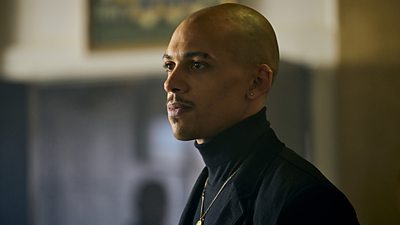
How would you describe the premise of This Town?
The bones of it - what makes it - is the Midlands. It’s a part of the country that’s given so much culturally over the years but doesn’t really get its flowers. Steven Knight has said this show is a love letter to the Midlands. It’s about different cultures that make our country, like Irish, Jamaican, and English.
The series is raw, honest and poetic – but it’s so much more than that.
How have you found working with your on-screen family, Levi and Nicholas?
It’s been beautiful working with Nicholas and Levi because not only are they both amazing actors, but they’re amazing people and we care for each other in real life. When we work with each other there’s a consideration that you don’t always get. We’ve grown together, we’ve learnt things from each other and not just one way – that’s been a joy to have.
What do you think are the core themes of This Town?
I think creativity coming out of struggle is definitely a big theme, and something I find true of life. The Midlands – at least the locations in the series - is a working class place, I’ve grown up working class and I’m proud to be working class.
Putting a lens on that to show what the working class have contributed, and why they’ve contributed it - because they weren’t born with ease, everything wasn’t handed to them. It feels nice to be making something that’s proud of that, and is showcasing it.
Nicholas Pinnock (Deuce)
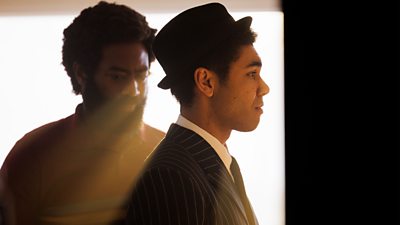
What can you tell us about Deuce?
Deuce is a Jamaican, ex-British army soldier. He moved to Birmingham at some point having met Brenda his wife who has been deceased for fifteen years. He was left to bring up his two sons, Dante and Gregory, with the help of Marie, who was Estella and Brenda’s mother. He was an alcoholic because he could not deal with the grief of his wife and the troubles of living in this country and being from another – this world all got to him. He has been ‘dry’ for four years, had become a preacher and is working at a factory. The boys and he are a very, very solid unit.
What really drew me to him was his authenticity, he is so layered and complex. He is fighting these demons within him the whole time, even when we see he is quite calm or when he is preaching. He is also a really good father and he tries his best to manage the different dynamics between his sons who are very different. But you can see that the relationships are good, they are very well nurtured. He has this thing about him that makes you want to know more.
Have there been any particular challenges taking on this role?
My family are Jamaican, so it’s not an accent that is unfamiliar to my ear from my household so that wasn’t itself a challenge. One of the biggest challenges of me approaching Deuce were his demons. On paper they seem like one thing but when you get on the floor with your fellow actors and director and you bring them to life they become something else. They become a lot harder than they seem and far more of a challenge off the page than on the page, which isn’t always the case.
What have been the biggest joys of the process?
For me the biggest joy of the process is having to work with such an amazing bunch of creatives. In all of my years doing this job, this has to be one of my top three. I have absolutely loved every minute of this show - the cast, the crew, the creatives. It has just been an absolute joy. Michelle has been wonderful to work opposite. All of the young ones have been a delight to be around. I have loved every minute of it. I have really enjoyed exploring this character and exploring it with them as well. You feel very safe creatively and that’s a really important thing for me and this has been brilliant.
Jordan and Levi are just wonderful men - great colleagues who have now become friends. It’s hard not to have a family dynamic when you have a family on screen. It’s then how that translates in real life and when you have that longevity, there’s substance in that. We are in an industry where everything is transient, you move from job to job to job, and at every job the people become your family. You make lots of colleagues and associates and have lots of nice moments. But how many people become your friends? I truly believe in this that we will stay in touch and we have already been in touch offscreen, in our own time, with things that have nothing to do with work. So, the dynamic on screen is very much reflective, certainly in many ways in what it is offscreen.
Peter McDonald (Eamonn Quinn)
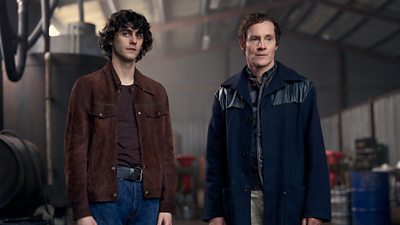
How would you describe This Town?
I think the series is about identity, particularly how the young characters at the centre try to forge their identify through artistic expression, music and poetry. And how that offers them a life with freedom, joy and all the good things about finding yourself. It’s also about resisting the narratives that have been placed on top of you by the people above, or by people older than you, the people who are perhaps in control of your life up until that point. To me it’s a real celebration of the music and culture of that time.
This Town is very much about people who are disaffected. It was a time of ‘no blacks, no dogs, no Irish’ and the communities this series looks at, and Steven writes about so well, are the people who are both on the edges of society but are also who society mainly consists of. It’s about how young people in this world, with not many advantages, find artistic sustenance.
How did you feel about taking on the character of Eamonn?
I grew up through the Troubles, I’m from Dublin. You never take that on lightly, there is a lot of pain, hurt and traumatisation over the years. It’s a very difficult situation and the solutions were never going to be easy and still aren’t fully resolved so you do feel apprehensive before you take on something that deals with that subject. I’m playing one character who is involved in that, he’s not representative of the whole struggle or the whole political dynamic, but he is one character who was involved in it. I take it on in that spirit.
What I saw was a man who is actually, strangely very vulnerable, but I don’t want to in any way offer a sympathetic portrayal of any character I play. I just find out what the truth is with the other creatives on the show. I’m really telling a story about a father and a husband who has been through the mill of the Troubles and now the way he treats and how he loves those close to him is distorted and misrepresented from where it would be perhaps coming from in other circumstances.
Did you learn anything new about the music of the era from being in this series?
I did a bit but I had to stay away from that side of it. My only disappointment in this show, because I play a bit of guitar, is that I was not involved in any of that. I would have loved to have been in the band. I kept suggesting that Eamonn might turn up with a bodhran or something but he doesn’t take an interest in that side of Bardon’s life. My research and what I was focused on was the conflict that Eamonn is engaged in.
Shyvonne Ahmmad (Matty)
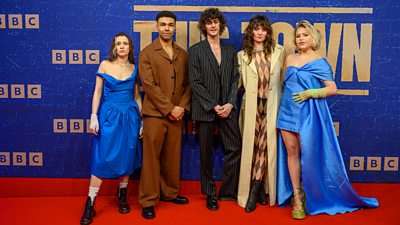
How do we first meet Matty?
We are first introduced to Matty in her natural habitat - behind a drum set on stage performing in one of the pubs. She comes out with a bang. She is super fierce, she is super loud. I lost my voice after doing that scene. You meet her in a small glimpse in the background which I really love whilst Gregory and the rest of the characters are going about their business. Then you meet her again later on because they need a drummer and so I pop out.
Matty is an incredible young woman who comes with a lot of her own struggles, difficulties and inner demons. She is incredible, she is bold and she is brave. You can’t miss her physically whenever she is playing. She is hired by the band to be a drummer. I think her and Dante connect very instantly. Some people in the group are happy with that and some people aren’t. She is disruptive. I don’t think she intends to be disruptive; she is just herself.
How did you feel about performing music in the series?
My first instinct was why did I not take lessons as a child? I had never taken a lesson but it kind of comes quite naturally to me because I am quite jittery and never sit still - I always kind of drum about. Then there’s excitement, it’s fun and a new challenge.
What was it like being put together for the first time as the cast?
I was nervous because I thought what if I don’t get on with them? What do I do then?! But actually, as I hope audiences will pick up on, everybody is so lovely, welcoming and encouraging. We met for the first time in Dan Carey’s studio. It clicked instantly. You don’t always get that so it’s a testament to casting director Daniel Edwards and director Paul Whittington and everyone who had a hand in bringing everybody together.
What can you tell us about Matty’s look?
With Matty it’s interesting because she is so different from everyone else which I love. Her costumes are incredible, they are so exciting. Everyone is a little more punk, a little more subdued until at least the very end. Whereas Matty is very bold, a lot of skin, confident, earthy, gritty, but also really cosy. We took a lot from Janice Joplin mixed with Karen Carpenter. She is an amalgamation of the kind of hippy and punk which I think is incredible. I think it’s very obvious when you see her that she is an outlier from everyone else. She likes to be that, she is very separate and very unique. She is in your face, ‘I am here, this is what I am wearing today’, and it makes her feel confident.
What does music mean to you and your character?
To Matty, music means everything. She doesn’t stick to one genre. Her line is I play what comes to me. She will pick up a pair of drum sticks to any music you put on really. But I think she probably enjoys the vibrancy of it and how revolutionary it was at the time - to amalgamate different kinds of music. I think she loves all music.
Paul Whittington (series director)
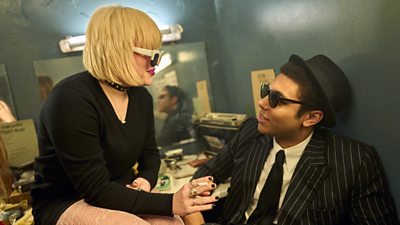
What excited you as a director to create a drama about this era’s culture?
I think what makes it exciting is yes, we’re capturing a particular moment in time – the early 1980s, these cultures and these young people taking what has gone before and creating something new. What I’ve always loved about this story is yes, there is wonderful element of nostalgia to it - particularly for those who are old enough to remember it at the time, loved the music and bought the clothes etc - but it is a universal story of how music evolves, how youth subcultures form, how young people take what their parents had and reinvent it, revitalise it and create something new.
In many ways I always thought this is a wonderful story set at a wonderful time in our history, but equally it could’ve been set at the start of the 1950s at the advent of rock n’ roll, or on a South London estate with the advent of grime. It’s what young people do, it’s universal in that sense and we all have our own experience of to one degree or another. That’s a wonderful because it’s part of growing up.
Any music-related youth subculture from the birth of rock n’ roll right through to now have the same characteristics, the same imagination and the same desire to express yourself. It’s true of all of them.
How did you approach the casting process and building up a band?
I think it was essential to the musical credibility and integrity that our band are a ‘real’ band. They really can do it, and play all the songs. All the band’s songs are our cast playing and performing those instruments. That’s essential.
The actors did come with varying degrees of music experience, some more so than others, but our approach was to put them through a kind of ‘band boot camp’. That included everything from intensively learning instruments, the songs that had been written for them, performing those and making them their own. From very early, rough demo form all the way through the process that any band would do, to a finished piece and then a full live performance.
There was a period of intensive rehearsals where all of that work was being done, where they spent an incredible amount of time together hanging out in the studio, going to the pub, all in each other’s company. That as much as anything bonded them as a band. It wasn’t having five individually talented musicians coming together, there was a real chemistry within the group that was born out of them being thrust into this situation that was quite intense and their full commitment to that. That experience of being together, all the time they spent off camera created a chemistry and a real band dynamic. Of course there was an incredible commitment to learning their instruments and songs but being in a band is so much more than that.
What conversations did you have about the tone and look for the series?
We’ve talked about the canvas for this world – the socio-economic reality of quite a hard, abrasive, difficult, challenging life where these characters are growing up – but what really leapt off the page for me when I first read Steven’s scripts was just how exciting a world it is to live in. That comes from an incredible energy from the characters and their outlooks on life. It was also a joyful, exuberant, beautiful world – all these contradictions – it felt like we had to capture that. That’s everything from how we move the camera, there’s a musicality to Steven’s writing that’s not literal music montage but a rhythm. We talked a lot about how the camera should be active, moving and rhythmic in that way to capture the storytelling. I read the scripts and thought they were so much fun, even though it goes to dark territory which is authentic, honest and real, but then it turns on a sixpence and can be something vital, energised and exciting. The tonal sweep of it was incredibly exciting to take on.
And how about costume?
There is a fine line to tread with period stuff to avoid you fetishising it, and what we wanted to do was capture its authenticity; capture something of the energy that was going in to how these young people would dress. Detail was essential but so was colour to tap into the vitality of this movement. That’s the overall canvas of this piece – vitality, colour, energy. It’s something that felt surprisingly contemporary as well, it’s not just about nostalgia it’s about a fashion or a look that feels very immediate. I think that costume designer Molly Emma Rowe captured that brilliantly.